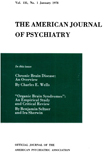INTELLECTUAL IMPAIRMENT IN HEAD INJURIES
Abstract
1. This investigation is concerned with the frequency and nature of intellectual impairment in head injuries.
2. The methods for evaluation of defects are discussed with special reference to the two criteria used in this study: comparison of performance with estimated intelligence, and improvement on repeated examinations.
3. The following tests measured the impairment best: 100-7 test, pictorial absurdities, hole-in-the-board test, pictorial discrimination, naming of colors, and reading.
4. The mental functions affected are primarily: speed, judgment, and ability to keep up a sustained effort.
5. About one-half of all subjects suffering from head injury show slight intellectual defects. These become less marked with increasing remoteness from the time of the injury. If the impairment is reversible, the duration is usually a matter of less than 3 months.
6. The impairment seems to be related to the severity of the brain damage. The more serious the intellectual defect, the higher is the incidence of abnormal neurological signs.
Access content
To read the fulltext, please use one of the options below to sign in or purchase access.- Personal login
- Institutional Login
- Sign in via OpenAthens
- Register for access
-
Please login/register if you wish to pair your device and check access availability.
Not a subscriber?
PsychiatryOnline subscription options offer access to the DSM-5 library, books, journals, CME, and patient resources. This all-in-one virtual library provides psychiatrists and mental health professionals with key resources for diagnosis, treatment, research, and professional development.
Need more help? PsychiatryOnline Customer Service may be reached by emailing [email protected] or by calling 800-368-5777 (in the U.S.) or 703-907-7322 (outside the U.S.).



